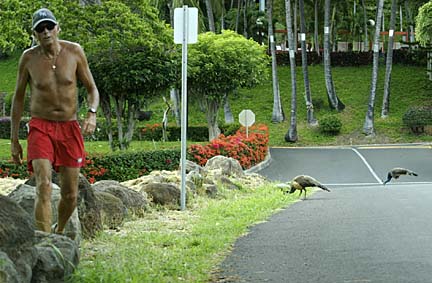
|
Pea-foul!
The paring of Makaha Valley
peacocks angers some
Residents of a Makaha housing complex are crying foul over a spate of peafowl killings done -- with a state permit -- by their resident manager.
It is unclear how many of the wild birds at the Makaha Valley Plantation have been killed, but residents estimate as many as a dozen during the last month.
The complex's management also was cited Monday by the Hawaiian Humane Society for caging three peacocks without access to food and water, said society spokeswoman Jacque Smith.
Residents who reported the incident to police said the birds had been in padlocked cages for about three days, but Smith could not confirm the allegation.
The complex's management and homeowners association president, Monty Glover, declined comment yesterday.
Two years ago the board of neighboring Makaha Valley Towers tried to thin its peafowl population in response to residents' complaints about the birds' screeching calls.
But before the birds were killed, Animal Rights Hawaii President Cathy Goeggel said yesterday, dozens of residents -- along with bird lovers from around the island and mainland -- complained and saved the five to six dozen peafowl on the condominium's property.

|
Residents' complaints apparently spurred the Makaha Valley Plantation's homeowners association to act, she said, adding that opposition to the plan could reverse the decision.
State Department of Land and Natural Resources Chairman Peter Young confirmed that Makaha Valley Plantation resident manager Otis King has a wildlife control permit to trap and shoot peafowl.
The permit was issued on June 7, 2004, and is set to expire June 30.
Young also said King has applied for a second permit, which would likely be issued in July. The permit allows King to kill peafowl that are a nuisance or health hazard to residents, Young said.
He said that the permit does not allow for any violations of state or county law to deal with the peafowl problem. Under the permit, peafowl can only be killed while they are "about to cause a nuisance."
But at least a dozen community members say the birds are not bothering anyone. In a flurry of e-mails sent to the Star-Bulletin in the last two days, residents asked that the peafowl be preserved.
"This seems -- yet again -- to be another effort to use unacceptable, uncivilized, unworthy and hidden means to arbitrarily kill as a means to solve a problem that was created by humans in the first place," wrote Mari Nakamura, an instructor at Windward Community College. "The human species claim to have the highest intelligence. ... They must act accordingly."
Animal rights groups are also up in arms.
The Wild Bird Rehab Haven, located in Honolulu, and Animal Rights Hawaii have contacted the Department of Land and Natural Resources with concerns about how the peafowl are being killed. Representatives from both organizations said they have received dozens of calls from residents asking what can be done to save the birds.
They also say those who live at Makaha Valley Plantation should be polled to find out how many want the birds killed.
"The residents should all be aware that this is going on and be able to have a say in it," said Mary Markl, of the Rehab Haven.
Goeggel said the issue of peafowl in Makaha Valley has come up several times in the last few years, as the birds are rampant in the area and their numbers are growing.
Land and Natural Resources spokeswoman Deborah Ward could not say how many wildlife control permits are issued for peafowl, but did say problems with the birds are reported islandwide, especially in communities near areas of dense foliage.
Peafowl -- peacocks and peahens -- are an introduced species and have no natural predators, which means their populations usually go unchecked.
Smith said those with peafowl problems can pare a population by shaking a peahen's eggs or coating them with vegetable oil to prevent them from hatching. Removing them, she said, will just lead a peahen to lay more eggs.
E-mail to City Desk
[News] [Business] [Features] [Sports] [Editorial] [Do It Electric!]
[Classified Ads] [Search] [Subscribe] [Info] [Letter to Editor]
[Feedback]
